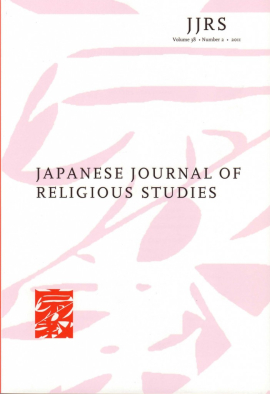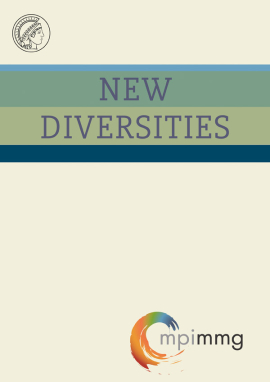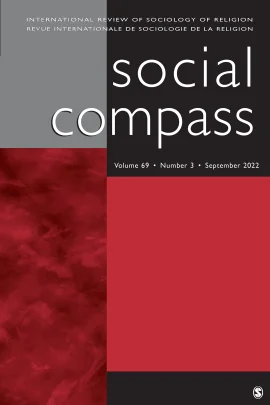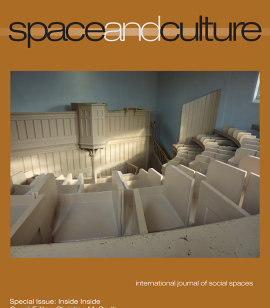|
If the newsletter does not display properly, please click here. |

|
||||
|
||||
|
Dear friends and colleagues, This week you are receiving our Wednesday Weekly exceptionally on a Thursday, as yesterday was a public holiday in Saxony. Nevertheless, we have a lot to share with you: Next week we will continue with our colloquium, as well as with our film series “Screening Religion”. We have four new publications by KFG members for you, as well as a new bulletin entry, a call for papers and a call for articles. Enjoy and have a good remaining week! Anja & Lucy |
||||

|
||||
Next week’s Colloquium: Asonzeh Ukah on “’Infrasacred’ Formations, Apocalyptic Politics and the Future of the Secular in Africa”, 23 NovemberNext Wednesday, our Senior Research Fellow Asonzeh Ukah will give a presentation on his research project “‘Infrasacred’ Formations, Apocalyptic Politics and the Future of the Secular in Africa”. The colloquium will take place in a hybrid format (on-site and online). If you would like to join in person, please register for the colloquium via e-mail. In the Member Area you will find further information including the zoom connection data.
Strohsack, Room 4.55 and online via zoom |
||||

|
||||
Screening Religion: “Soviet Hippies”, 23 November at naToOur Screening Religion film series continues: The film “Soviet Hippies”, directed by Terje Toomistu, tells the story of the Western hippie movement’s profound impact on the other side of the Iron Curtain. Within the Soviet system, a colorful crowd created their own system, which connected those who believed in peace, love, and freedom for their bodies and souls. There was a widespread desire among the hippies to experience something more than the bleak promise given by the Soviet power regime. The film will be shown at the Cinémathèque Leipzig at naTo in Estonian, Russian and English language with English subtitles. There will be a discussion afterwards.
Cinémathèque Leipzig at naTo, Karl-Liebknecht-Straße 46, 04275 Leipzig Free entry, donations welcome
|
||||
|
||||
|
||||
|
||||
|
||||
|
||||

|
||||
New Bulletin Entry: Lydia Ginzburg on “Public Transportation on Saturdays – Revisiting Jewish Secularity in Israel”Our guest Lydia Ginzburg from The Hebrew University of Jerusalem who spent one month at our KFG, has contributed an article on the topic of “Public transportation on Saturdays – Revisiting Jewish Secularity in Israel” to our Bulletin. Here she argues that the scrutiny of public transport on Shabbat underlines the relevancy of the Multiple Secularities perspective, in examining the entangled connections between religious and secular institutions, discourses and daily practices, in order to better understand different configurations of secularity on a global scale.
|
||||

|
||||
Call for Papers: “Secularisms Under Pressure. Comparative Perspectives” for ISSR Conference, 4–7 July 2023From 4–7 July 2023, the 37th Conference of the International Society for the Sociology of Religion (ISSR) will take place in Taiwan. In that context, our Senior Research Fellow Roberto Blancarte together with David Koussens from the Université de Sherbrooke and Kiyonobu Date from the University of Tokyo, is organizing a thematic session on “Secularisms under Pressure. Comparative Perspectives”. The session will deal with the pressures that contemporary forms of secularism are facing today, specifically the confrontation with the rise of populism and attempts to reintroduce religion into the political arena as well as the delegitimization of fundamental rights, correlative to a shift in liberal paradigms.
ISSR Conference Date: 4–7 July 2023
|
||||

|
||||
Call for Articles: Special Issue of Religions on “Religion and Planetary Climate Crisis”We would like to draw your attention to a Call for Articles for the Special Issue of the journal Religions on the topic of “Religion and Planetary Climate Crisis”, where this crisis is understood to be biogeochemical, especially in geological time frames, but also political, economic, technological, ethical, and therefore, biocultural. This opens up the need for humanities scholars to rapidly address rapid global heating in their research and teaching, and thus, the requirement for the field of religious studies/theology to rapidly do the same. This Special Issue aims to look at how theology may be responding to imminent climate regime shifts; how the sociology of religion may inform readers on how human groups are (or are not) using religion to organize around climate change; how concepts of religious health within religious communities may (or may not) be responding to the negative health impacts of runaway climate change; and how religious ethics may (or may not) be changing to address the normative elements of runaway climate chaos.
|
||||
|
If you have any content that you think suits the purpose of the weekly, please feel free to send it to us at multiple-secularities@uni-leipzig.de. |
||||
|
Kolleg-Forschungsgruppe "Multiple Secularities - Beyond the West, Beyond Modernities" Nikolaistraße 8-10, 04109 Leipzig Mail: multiple-secularities@uni-leipzig.de |



